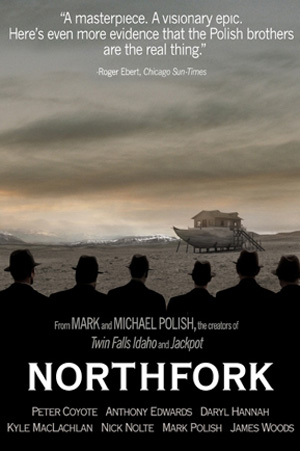
NORTHFORK
US, 2003, 104 minutes, Colour.
James Woods, Mark Polish, Duel Farnes, Nick Nolte, Anthony Edwards, Daryl Hannah, Ben Foster, Robin Sachs, Peter Coyote, Kyle MacLachlan?.
Directed by Michael Polish.
According to the opening of this mysterious film (a blend of realism and fantasy), Northfork was a town that went underwater when a Montana dam was built. We see footage from the 1950s showing the engineering feat, the civic pride and the hopes of the time. The film, however, is about a group of suited bureaucrats who have to tour the area, persuading the last remaining residents that they must leave.
So far, so good. This is a film made by the Polish brothers, Michael and Mark. With Twin Falls Idaho and Jackpot, they have completed a trilogy of films about towns in the American northwest states. They are not content to show the mere realities of these towns, they want to find the spirit of the towns and the people who lived there. With Northfork, they have opted for a central fantasy where a sickly boy who is being looked after by a reverend (Nick Nolte) creates a world where a really odd group of characters fly in and rescue him. Audiences who are not paying attention may be wondering where reality ends and fantasy begins. And audiences may not be paying attention since the film is demanding and proceeds with a very measured pace.
Besides being a fable, the film is also visually poetic in its use of the Montana valleys and hills and some beautiful shots of landscapes and skies.
The Polish Brothers have a fine cast to work with led by James Woods as a bureaucrat who has to face the issue of transferring his wife's grave from Northfork. The fantasy group includes Darryl Hannah and Anthony Edwards.
The best summing up is probably to say that this is 'specialist viewing.
1. The work of the Polish brothers? Small-budget films, independent? Their portraits of towns in the north-west of America?
2. The film as a poem, combining magic realism with realism, fantasy and dream sequences? The combination for an overall impact?
3. The film as a poem with its visual images, landscapes, the weather, the skies? The musical score?
4. Images of death and dying, the meaning of living? The flooding of the valley as an image of death?
5. The portrait of the small town, the stills during the opening credits, the newsreel background, the 1950s, engineering, the making of the dams? The visual impact of the dam plant? The landscapes of Montana, the need for water? Power and energy? The officials, opening ceremonies? The comments on the officials and their integrity? The people having to move?
6. The last days of moving, the couple bringing Irwin, his being returned to Father Harlan, his illness, the couple not able to manage, the sarcastic comments of Father Harlan? Their going on a journey, his not being able to journey? The portrait of the later couple who were interested in adopting Irwin? Their motivations?
7. Irwin, his illness, Father Harlan and his care, the old-fashioned dormitory, feeding him, tenderly caring? His Hercules book and its influence on his fantasies?
8. Irwin's fantasy - the group, their appearance, their interactions? Their being seen as his angels? The different aspects that they represented: the blind, double amputee with the ironic name of Happy? His difficulty in reading, his being the engineer? Flower Hercules and her clothes, the pins in her forehead, androgynous, childless? Cod and his being mute, his just sitting there being a presence? Cup of Tea, drunk, cynical, androgynous manner? Their being in the afterlife, their problems carried from their life on Earth, their attempts to resolve them? Their mission, to find the unknown missing member of their group, Irwin as the missing member? Their not being seen by Father Harlan, by Walter? The end, their going to the plane, leaving?
9. Father Harlan, his gruff manner and style, the last to go, his being judgmental on others, the genuineness of his care for Irwin?
10. Walter and the team, the sequence of their being commissioned, their uniform dress, their representing the bureaucracy? Going out in pairs? The people they were urging to leave, the man shooting the car? The man with the ark? Walter and his son, Walter's dilemma with the letter asking him to remove his wife's coffin? The scene at the cemetery? The power of persuasion, the danger in going into the houses - going into the house which was halved, with snow falling in the middle? Walter's son and his more down-to-earth approach?
11. The cemetery, the information about the deceased, the pressure on Walter to take his dead wife, his fantasy and imagining? The coffin emerging from the dam? The crisis for the two? The son and his being far more critical of his mother?
12. The impact of the film as a narrative, as a poem, as a fantasy? Representing non-studio American film-making and perspectives?